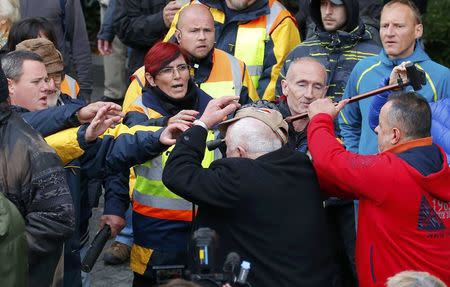Hungary's Orban rejects 'Sovietization' by Brussels, defends nation state
By Marton Dunai BUDAPEST (Reuters) - At a commemoration of a 1956 anti-Communist uprising, Hungary's right-wing leader Viktor Orban said his country must stand up to Europe's "Sovietization" and defend its borders against mass migration. Orban, a critic of the European Union and an early opponent of the recent migration wave into the continent, said freedom in Europe depended on the nation state and Christian traditions. "People who love their freedom must save Brussels from Sovietization, from people who want to tell us who we should live with in our countries," the prime minister said to cheers from a crowd of several thousand. "We want to be a European nation not a nationality within Europe," he said. A few hundred opposition protesters whistled loudly as Orban spoke, and brawls broke out in the crowd between his supporters and opponents. "We cannot create freedom while this despicable leftist opposition exists," said Laszlo Barta, an Orban supporter with a Hungarian flag flung across his shoulders. Along with other ex-Communist countries in eastern Europe, Hungary opposes a policy that would require all EU states to take in some of the hundreds of thousands of mainly Muslim migrants seeking asylum in the bloc after arriving last year. Orban has led resistance to the stance taken by German Chancellor Angela Merkel, who has said EU states have an obligation to share the burden of taking in refugees. He responded to the influx last year by sealing Hungary's southern borders with a razor-wire fence and deploying thousands of soldiers and police. "As heirs to 1956 we cannot allow Europe to cut the roots that made it great and helped us survive the Soviet suppression. There is no free Europe without nation states and thousands of years of wisdom from Christianity," he said on Sunday. "We must close the border to stop the mass migration that flows from the south." Polish President Andrzej Duda, the guest of honor at the commemoration, assured Hungarians of support from Warsaw. "You can count on Poland, we march together in the toughest moments," Duda told supporters waving Polish flags. "Two countries which were built on Christian foundations and are now free in the unified Europe." (Reporting by Marton Dunai; Editing by Ros Russell)





